What is the Most Interesting Thing you Hope to do?
by Julie Beicken
Power, History, and Society (PHS) has for years provided an invaluable forum for faculty and graduate students interested in political sociology and comparative and historical sociology. Recently, the organization has offered graduate students and faculty the very unique opportunity of participating in workshops with esteemed members of the field, Dr. Theda Skocpol in the spring of 2014 and this past week (February 6, 2015), Dr. Randall Collins. Both Skocpol and Collins are giants in Sociology—not only in their specialty areas but the discipline on the whole. Both have straddled many divisions within sociology—from historical sociology to human behavior, from macro to micro, etc.—and utilized multiple methods in their work. The opportunity for graduate students to spend even just a couple of hours in their presence is a truly wonderful gift that PHS has given to the department and the UT community on the whole.
Collins began the workshop on Friday morning with a challenging question to the students. Rather than having us state our names and areas of study, as is often the case in these settings, Collins had us explain the most interesting thing we would like to do. While a small degree of discomfort was immediately visible on many students’ faces, the exercise prompted us to think outside of our immediate sociological worlds of comprehensive exams and dissertations and think big—what would we really like to look at/wrestle with/study/explore? The answers—from gaining greater access to elites to establishing methods to study social media—were exciting and helped us to think about our existing work within our field of study and pushing it to new depths.
Collins, like Skocpol, has been a part of sociology for a long time. Both have seen the discipline go through many changes. As graduate students, for whom the ‘now’ of sociology is very pressing, it is exciting to have the opportunity to engage with scholars who understand the constraints of the disciplinary moment but also see the possibility for innovation. For example, Collins spoke with ease about transitioning from his micro work to his macro, something that seems like a huge challenge to many of us. Similarly, Skocpol talked about matching method to her research question, and being open to multiple methodologies. Both workshops have given students at UT the chance to speak openly and frankly with experts of sociology, and we have all walked away the wiser for it.
Doing Quality Sociology: Moving Beyond the Quantitative-Qualitative Debate.
by Amina Zarrugh
Dr. Randall Collins posed a seemingly simple, but exceedingly thought-provoking, question to commence the graduate student workshop – what is the most interesting thing you hope to do in your work? The question in isolation appeared simple, but as student brows wrinkled in perplexity and eyes averted upward in contemplation, it was clear that the question hadn’t been asked of us in a long time, if ever. Everyone in the room ultimately had an opportunity to share their aspirations. These intellectual ambitions ranged from learning about populations difficult to access—such as interviewing prisoners at the Guantanamo Bay detention camp or understanding the dynamics of why individuals return to their country of origin after migrating elsewhere—to making memorable interventions and contributions in our respective fields.
This introductory query, and the collective responses that followed, set the tone for the workshop, which concerned the state of sociology today and the spaces open for innovative work. A central tenant of the discussion was that the overuse of the qualitative-quantitative semantic among sociologists and erected institutionally in departments emerged a false dichotomy. Regardless of overtures to the contrary, qualitative and quantitative work is mutually constitutive.
Qualitative work, including historical sociology and ethnography, informs and delineates the very categories with which quantitative sociology deals so squarely. Despite the primacy and privilege accorded to quantitative sociology, both financially by way of funding structures and socially by way of policy relevance, some of the most dramatic and influential work in the field of sociology has been qualitative. Collins invoked Emile Durkheim, who stated that “history should be sociology’s microscope,” to emphasize how deep historical perspective can offer new variables and contexts of understanding that are mutually beneficial to advancing both qualitative and quantitative work and, ultimately, our understanding of pressing societal issues.
These discussions brought to the fore the importance of thinking creatively about methodologies, the forms of data we collect, and the assumptions we make in the process. Collins (who was trained within the school of symbolic interaction) believes in expanding data used to understand social life to include videos, social media posts, and photographs. His attention to incorporating new methodologies and materials into the fold of sociology echoes calls for innovations that have been taking place across the social sciences. It also resonates with conversations in our department over the past several years, such as the Race and Ethnicity Group’s discussion about “live methods” with Goldsmiths University of London Professor Les Back in May 2013, or the talk by University of Warwick Professor Gurminder K. Bhambra in the week that followed Collins’ visit.
The thread that binds the ongoing discussions in our departmental community is the transition from what I’ve come to call a “bigger, better, faster, stronger sociology” (i.e., more interviews, bigger data sets, exclusive networking opportunities) to a more reflexive, thoughtful, sincere, and conscientious approach to sociology. Then, perhaps most significantly, to our own interactions with one another as colleagues. This change must start with us individually, as exemplified by the question Collins posed at the start of the workshop. However, any “statistically significant” change is made possible through genuine solidarity, and robust support for one another that simultaneously transcends and is strengthened by our methodologies, our areas, and our geographies of study.

